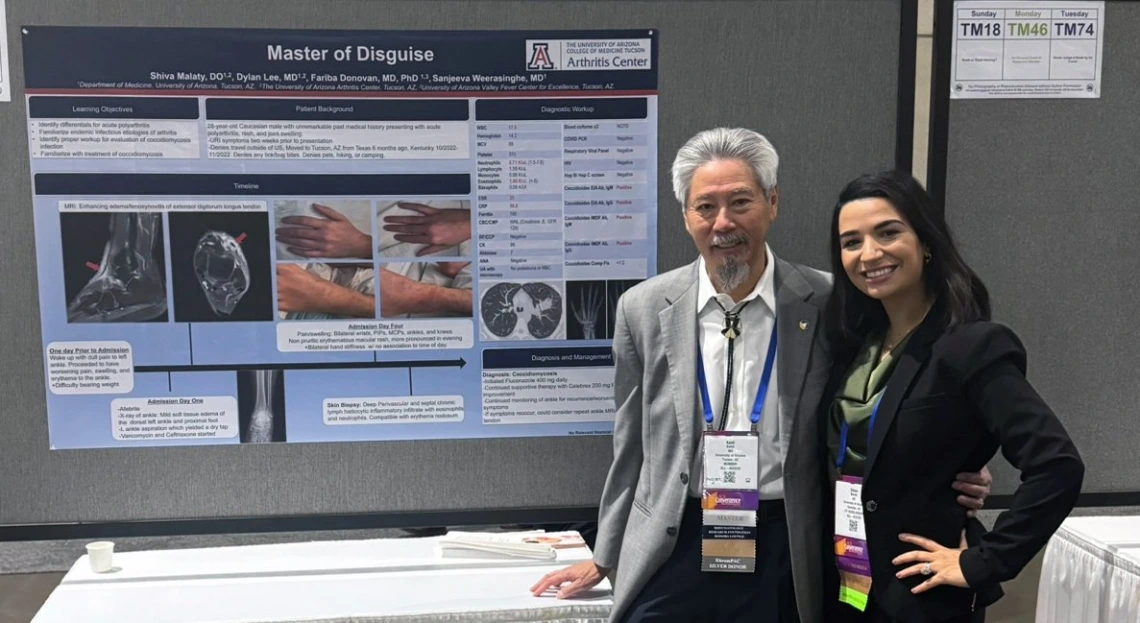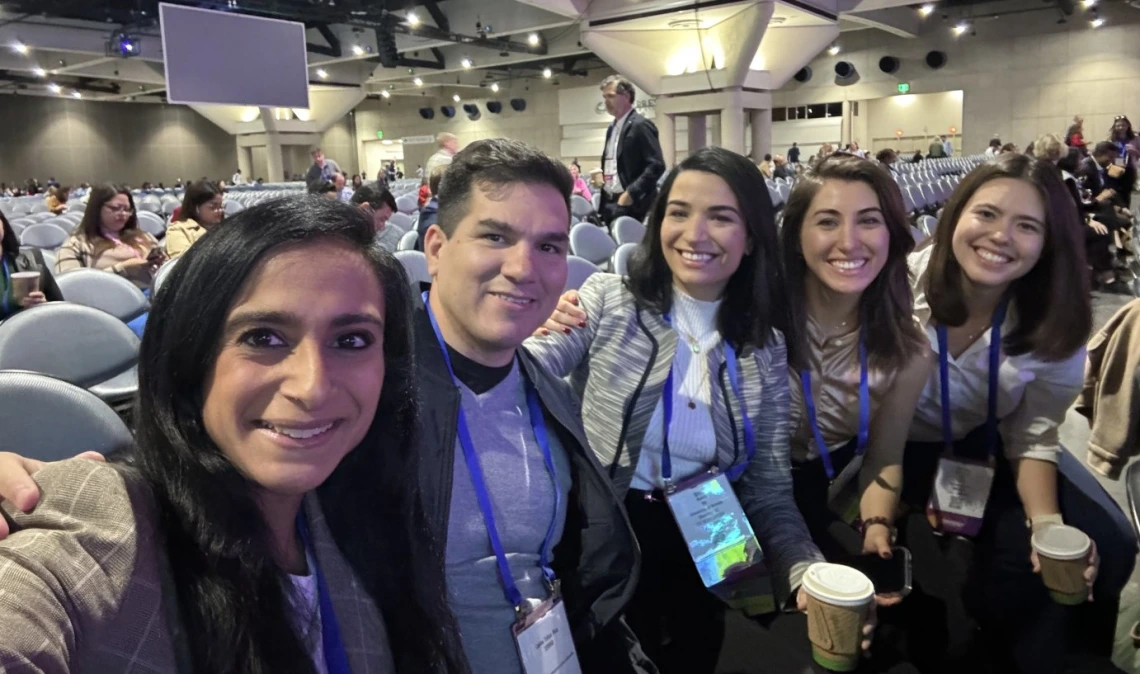The Rheumatology Fellowship Training Program at the University of Arizona has a long tradition of academic excellence and provides outstanding clinical and research training. The Division of Rheumatology recruits two to three new fellows each year, for a total of five to six in the two-year Fellowship Training Program. We are particularly interested in candidates who intend to pursue an academic research career. For these individuals, a three-year research/physician-scientist track is also available.

Goals and Objectives
- To provide the fellow with the knowledge and skills to achieve clinical and procedural excellence in the practice of Rheumatology.
- To provide training in diverse clinical settings, thereby allowing the fellow to develop adaptability to function in a variety of future settings (e.g., academia, clinical practice or industry).
- To facilitate the development of the fellow’s commitment to lifelong learning.
- Demonstrate mastery of the clinical evaluation and management of common and complex rheumatic and musculoskeletal diseases, as well as systemic diseases with rheumatic manifestations, by obtaining core knowledge of clinical manifestations, clinical presentations, pathophysiology and management. This knowledge base includes:
- Relevant anatomy, genetics, biochemistry, immunology, pathology, physiology, pharmacology, epidemiology, biostatistics, ethics, and human behavior relative to the practice of rheumatology.
- Clinical skills of data collection, including history-taking, physical examination and the appropriate request of laboratory/imaging studies, and ability to analyze clinical data in the context of a basic fund of medical knowledge.
- Ability to formulate appropriate differential diagnoses and therapeutic plans.
- Ability to perform and/or interpret diagnostic and therapeutic procedures common in the practice of rheumatology.
- Understanding of the principles, indications, contraindications, risk, cost and expected outcome of these diagnostic and therapeutic procedures.
- Demonstrate proficiency as a consultant by communicating the relevant history, physical examination, laboratory/imaging findings, and a concise assessment and plan.
- Demonstrate the ability to work as a member of an interdisciplinary health care team.
- Demonstrate the requisite communication skills to function as a member of an interdisciplinary health care team.
- Model professionalism and humanistic skills to other members of the interdisciplinary health care team.
- Demonstrate teaching proficiency in communication of knowledge and skills to medical students, residents and co-fellows in formal and informal settings.
- Demonstrate independent study habits in the acquisition of clinical and research knowledge and skills.
- Present and actively engage at Grand Rounds, Journal Clubs, Works-in-Progress seminars and other conferences.
- Perform critical appraisal of the medical literature and thereby gain a basic understanding of epidemiology and biostatistics; determine whether results support conclusions; interpret the generalizability of results; and understand how to translate research findings into clinical practice.
- Design and perform at least one research or quality improvement protocol and present the protocol and results at Works-in-Progress seminars. The product should be of sufficient quality to be submitted for presentation at a national meeting and subsequently as a manuscript.
- Serve as a co-investigator on industry-sponsored phase 2 and/or phase 3 clinical trials to better understand the drug development and approval process.
- Develop skills and demonstrate proficiency in systems-based learning and practice-based learning.
The UA Rheumatology Fellowship offers a broad range of educational experiences and encompasses the areas of clinical rheumatology, research and teaching. Each of these components includes hands-on practical experience as well as didactic conferences and seminars.
Our clinical component is designed to provide the foundation necessary to achieve a superior level of clinical competency in the subspecialty of rheumatology. Utilizing the teaching facilities at Banner-University Medical Center, Tucson, the Southern Arizona VA Health Care System, and the Indian Health Service, our fellows receive intensive training in the care of patients across a spectrum of both common and uncommon rheumatic and musculoskeletal diseases.
Our research component is customized to the interests and future plans of each individual trainee. It consists of a minimum of one scholarly project per year and participation in ongoing industry-sponsored Phase 2 and Phase 3 studies of novel therapeutic agents in the Clinical Research Unit. More focused experience is available for trainees with specific interests in basic biomedical, translational or clinical research.
Our teaching component allows for the transfer of knowledge to the next generation of providers who will care for patients with rheumatic and musculoskeletal diseases. Fellows are given the opportunity to directly participate in the education of medical students, graduate students, other trainees, faculty, and community practitioners.

The University of Arizona Rheumatology Fellowship Training Program is supported by core and affiliated faculty who are internationally recognized for their leadership in the fields of rheumatology, orthopaedic surgery, immunology, epidemiology, and other related disciplines. Many have held leadership positions in the American College of Rheumatology, the Association of Rheumatology Health Professionals, Osteoarthritis Research Society International, and other organizations.
The history of arthritis research at the University of Arizona dates back to 1961 with the work of the Southwestern Clinic and Research Institute (SCARI) sponsored by the Holbrook-Hill Clinic. In 1978, the University of Arizona received one of the original 11 NIH-funded Multipurpose Arthritis Center (MAC) grants, and in 1985, the University of Arizona Arthritis Center (UAAC) was designated by the Arizona Board of Regents as one of the four original Centers of Excellence at the University of Arizona.
As a world-class training program, the University of Arizona affiliated hospitals and clinics offer fellows a unique and diverse experience. Caring for patients from throughout Southern Arizona provides a vast canvas of clinical care training opportunities: Where We Practice
We also invite you to explore the outstanding Tucson community with its superb culture, colorful history and college town atmosphere: Living in Tucson - A Great Place to Learn and Grow

